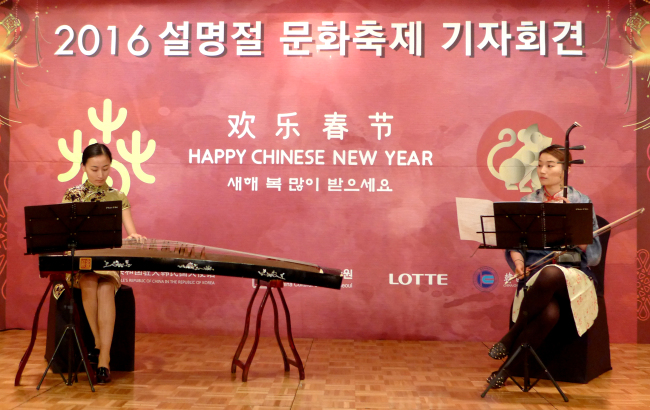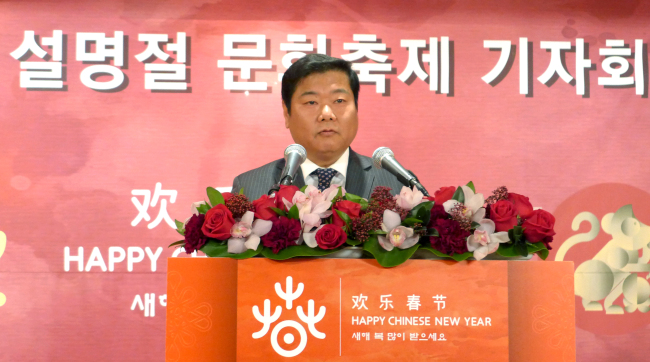The Chinese Embassy organized a series of events last week to promote the Lunar New Year, known as “Chunjie” in Chinese.
As the largest annual holiday across Confucian communities worldwide, including in Korea, where it is called “Seollal,” the festivities lasts over a week in China, bringing together relatives from far and wide.
In an effort to strengthen cultural ties with Korea, the embassy has hosted the celebrations here since 2010, which have grown in leaps and bounds.
 |
Traditional Chinese musicians perform at a press conference last week to introduce New Year’s holiday events in Korea. (Joel Lee / The Korea Herald) |
 |
Shi Ruilin, director of the China Cultural Center in Seoul. (Joel Lee / The Korea Herald) |
The initiative is supported by the Beijing government, in partnership with various cultural institutions and diplomatic missions around the world. It showcases over 2,100 programs in some 400 cities and 140 countries across the globe. Some of the programs include traditional customs and costumes, theatrical and musical performances, handicrafts and demonstrations of intangible heritage.
“Chunjie is the most important holiday for the Chinese people with a 4,000-year history,” said Shi Ruilin, director of the China Cultural Center in Seoul, at a press conference on Jan. 25.
“During every Chunjie, people post auspicious signs on doors, pillars and windows, dress up in new clothes and buy holiday gifts. Families congregate together and go shopping, cook traditional food, perform ancestral rites and hope for a prosperous spring.”
The anniversary embodies the Chinese civilization’s ideology and sentiments, promoting a message of harmonious coexistence and functioning as an important conduit for learning, he added.
This year, the embassy ― in collaboration with the China Cultural Center in Seoul, the China Chamber of Commerce in Korea, the Chinese Consulate-General in Busan, and several cultural institutions and private sponsors ― has organized various events under the banner, “Natural holiday, familial holiday and spiritual holiday.”
The performances include traditional dance, music and stage performance; demonstrations of calligraphy, herbal medicine, embroidery, carpentry and porcelain-making; Beijing opera and a street parade; and a fashion show and classical concert marking the China-Korea free trade agreement that entered into force in December last year.
(
joel@heraldcorp.com)









![[Today’s K-pop] Blackpink’s Jennie, Lisa invited to Coachella as solo acts](http://res.heraldm.com/phpwas/restmb_idxmake.php?idx=644&simg=/content/image/2024/11/21/20241121050099_0.jpg)